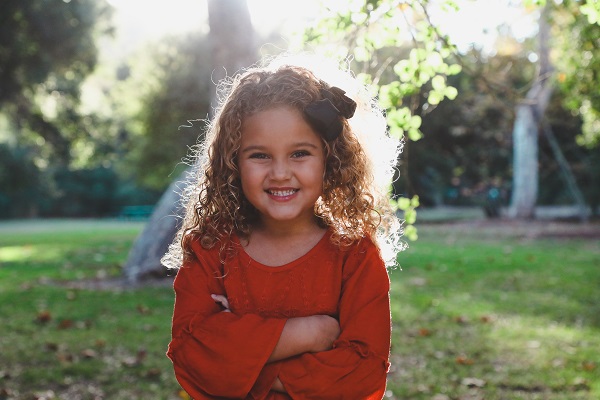“Her hair is so pretty! I wish my child had hair like that” … If your child is blessed with naturally curly locks, you have probably heard this compliment many times.
While you may agree with the sentiment, looking after those curls can take a lot of work! It’s especially hard if your child dislikes having their hair brushed or washed.
Thankfully, there are ways to care for those curls with a minimum of fuss.

Tips for Caring for Curly Hair
- Make up a spray bottle of water mixed with conditioner. Spritz your child’s hair till damp, then comb with a wide tooth comb.
- Start detangling curls from the ends as combing from the scalp hurts! Hold a section of hair loosely in one hand, then use the other to gently comb and detangle. Gradually work your way up to the scalp.
- Conditioner is curly hair’s best friend! Use shampoo sparingly, and conditioner lavishly. Rinsing with cool water can eliminate frizz.
- After washing, gently blot hair with a towel to remove excess water. Comb the hair or use fingers to separate the curls.
- Use leave-in conditioner or a hair mask to ramp up the moisture.
- Sleeping on a silk pillowcase or wearing a satin sleep bonnet can reduce knotting and tangling.
Whilst curly hair can be controlled (when you know how), one thing parents can’t control is their child being teased or bullied at school.
I know firsthand how awful it can be. When I was young, I was relentlessly picked on for my curly hair. One of my teachers even commented on my messy hair and reprimanded me for not brushing it before school.
For a shy kid like me, it was mortifying! What no one realised was that I had brushed my hair. It just refused to stay tidy, especially on windy days, which I hated.
Self Esteem and Bullying
Good self-esteem means a child feels accepted, confident, and good about themselves.
When a child is bullied (whether it’s about their hair or something else), they can feel inferior to their peers. Their confidence plummets and they become self-critical.
This can be heart-breaking for parents to witness, but there are some things you can do to help your child.
Overcoming bullying
If your child tells you they are being bullied, listen and offer compassion, comfort, and support.
Praise them for speaking up and remind them they’ve done nothing wrong. Point out that the bully is the one behaving badly.
Encourage your child not to retaliate, then explore their options. For example, they can avoid the bully, ignore them, tell them to stop or walk away.
Bear in mind that children often don’t want parents to intervene on their behalf. A private chat with your child’s teacher can let the school know there is a problem. These days, most schools have anti-bullying programs in place.
Rebuilding Self-Esteem
Your child’s self-esteem can be rebuilt by emphasising their strengths, talents, and positive characteristics.
Learning new skills can build confidence, whether it’s music, art, sport, or another hobby. As they gain proficiency, children feel proud of themselves and their achievements.
